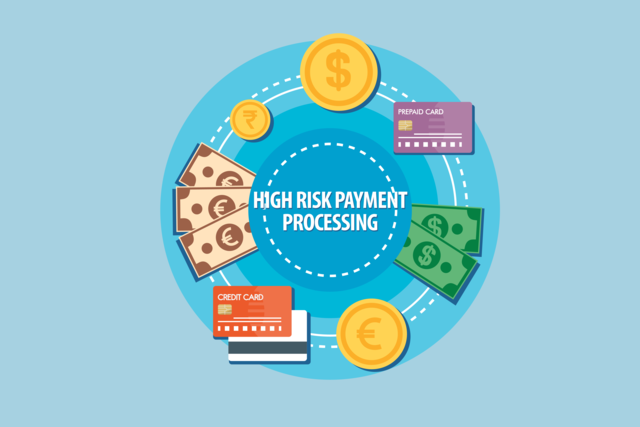AUTHOR : ADINA XAVIER
DATE : 14/09/2023
In the world of business and finance, payment processing[1] plays a pivotal role in facilitating transactions. However, not all businesses[2] are created equal, and some operate in industries that are considered high-risk by financial institutions. It is a topic that demands attention and understanding, as it can greatly affect the operations and profitability of businesses. In this comprehensive guide, we will delve into the nuances of it , exploring what it entails, why it matters, and also how businesses[3] can navigate this intricate terrain.
1. Introduction: Decoding High-Risk Payment Processing
Payment processing[4] serves as the lifeblood of businesses[5], ensuring a smooth flow of funds. However, when a business is labeled as high-risk, it enters a complex realm of it that demands careful consideration and strategy . In this article, we will dissect , starting with understanding what classifies a business as high-risk.
2. What Defines a High-Risk Business?
High-risk businesses are those that operate in industries characterized by a higher likelihood of financial instability, legal issues, or fraudulent activities. Some common examples include online gambling, adult entertainment, and also debt collection agencies. Understanding the factors that categorize a business as high-risk is the first step in navigating the associated challenges.

3. Why Does High-Risk Payment Processing Exist?
This exists as a specialized niche within the financial sector due to the increased risks associated with certain businesses. Traditional payment processors often shy away from these industries, leading to the development of specialized solutions that cater to their unique needs.
4. The Challenges of High-Risk Payment Processing
It is not without its challenges. From higher processing fees to stricter underwriting requirements, businesses in this category must overcome various obstacles to maintain a functioning payment system[1]. We’ll explore these challenges in detail.

5. Key Players in the High-Risk Payment Processing Ecosystem
To navigate it effectively, it’s essential to know the key players involved. From acquiring banks to payment gateways, understanding the roles of each entity is crucial for success.
6. Risk Mitigation Strategies for High-Risk Businesses
Mitigating risks is paramount for high-risk businesses. We’ll discuss strategies that can help these businesses minimize their exposure to financial and legal pitfalls.
7. Compliance and Regulations in High-Risk Industries
High-risk industries often come with a web of regulations and compliance requirements[2]. Staying on the right side of the law is imperative, and we’ll provide insights into how to do just that.
8. Choosing the Right High-Risk Payment Processor
Selecting the right payment processor can make or break a high-risk business. We’ll offer guidance on how to choose a partner that aligns with your specific needs and also goals.
9. Benefits of Specialized High-Risk Payment Solutions
Specialized payment solutions tailored for high-risk businesses can offer numerous advantages. We’ll explore the benefits of utilizing these services and how they can contribute to the success of your venture.
10. Case Studies: Successful High-Risk Payment Processing
Real-world examples often provide the best insights. We’ll showcase case studies of businesses that have effectively navigated the challenges of high-risk payment processing, highlighting their strategies and also outcomes.
11. Additional Considerations for High-Risk Payment Processing
While we’ve covered many aspects of high-risk payment processing, there are some additional factors to keep in mind.
Chargebacks and Disputes
High-risk businesses often experience a higher rate of chargebacks[3] and payment disputes. It’s crucial to have effective systems in place to manage also mitigate these issues. This might include a robust customer service team, clear refund policies, and monitoring tools to detect fraudulent chargeback requests.
Payment Security
Security is paramount in high-risk industries. Implementing advanced encryption and security measures is non-negotiable to protect sensitive customer data and also maintain trust.
Emerging Technologies
Staying abreast of emerging payment technologies is essential. High-risk businesses should consider embracing innovative payment solutions that cater to their specific industry needs.
Financial Planning
Due to the inherent risks, high-risk businesses should have a solid financial plan in place. This includes maintaining a reserve fund to cover potential losses and having access to working capital when needed.

Conclusion
In conclusion, high-risk payment processing is a critical aspect of many industries, and understanding its intricacies is vital for businesses operating in such domains. By grasping the nuances of this niche, selecting the right partners, also implementing sound risk management strategies, high-risk businesses can thrive in an ever-evolving financial landscape.
Frequently Asked Questions (FAQs)
1. What industries are considered high-risk for payment processing?
High-risk industries include online gambling, adult entertainment, debt collection, and more. These businesses face increased financial and legal risks also.
2. How can high-risk businesses reduce processing fees?
High-risk businesses can explore different payment processors, negotiate fees, also implement fraud prevention measures to reduce processing costs.
3. Are there regulations specific to high-risk industries?
Yes, high-risk industries often have specific regulations also compliance requirements that businesses must adhere to. Disregarding these guidelines may result in potential legal repercussions.
4. What is the role of an acquiring bank in high-risk payment processing?
An acquiring bank is responsible for processing credit also debit card transactions. In high-risk payment processing, they play a crucial role in underwriting and also risk management.
5. Why is it important to choose a specialized high-risk payment processor?
Specialized high-risk payment processors have experience and expertise in dealing with the unique challenges of high-risk industries, making them better equipped to support these businesses.





